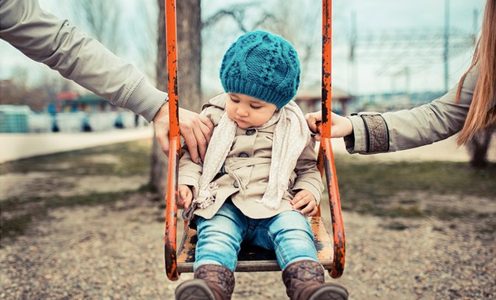Winnipeg divorce lawyer Paul Sweatman shares his thoughts on staying together for the kids…
“I could never do that to my kids.”
A friend of mine said this when he was considering divorce. He had three kids, aged 12-17, and he was worried sick about them should he separate from their mother. Would they fall into a depression? What was the evidence for serious psychological harm to kids when their parents call it quits? Staying together for the kids seemed to be the best option.
This is rough stuff. He said that if separation increased such risks for his kids, he would ‘tough it out’ and stay married for the kids, at least until they were finished high school, which for him meant a minimum of six more years of misery. He and his wife were obviously unhappy together; the kids could see it, everyone could. Sure, they could fake it here and there—perhaps a dinner with the grandparents, Christmas mornings, time at the beach where there were lots of distractions. But it hurt his very being (and hers, no doubt). The pull-out couch was getting harder to sleep on every week.
Stats on divorce and its impact on kids
He researched all the evidence he could find against separating. Try it. Go online and look for the stats on divorce and its impact on kids and on parents. You might not come to any conclusions but you’ll find out that:
- Studies from 1980-81 revealed that children with divorced parents did less well at school (Andrew J. Cherlin, Marriage, Divorce, Remarriage, 1981).
- Teenage children of divorce are more likely (35% instead of 13%) to need psychological help. As well, children from divorced parents are more prone to health problems and have greater problems with relationships than those from two-parent homes. (Peter Hill, Recent Advances in Selected Aspects of Adolescent Development, Journal of Child Psychology and Psychiatry, 1993).
- Adult children of divorce are twice as likely to attempt suicide (Velez-Cohen, Suicidal Behavior and Ideation in a Community Sample of Children, Journal of the American Academy of Child and Adolescent Psychiatry, 1988).
He shared all this with me, so I said to him: ‘Of course you are worried about your kids and yes, I get it that you would never intentionally do anything to hurt them. But there’s also evidence that separating is the better thing to do—for everyone involved. Your kids, your spouse, and don’t forget about yourself. What does ‘The Whole Picture’ look like?’
The whole picture
Well, that set him on a path of discovery and last I heard he was holed up in a small dark room weighing split hairs. He found himself in a deep funk and, for a while, he put aside his research and decided to grit his teeth for the long haul.
We had coffee around that time. He reviewed more of his findings and concluded that his life was now dedicated to misery, and he hoped his gloom didn’t wear off on his kids.
I tossed back: ‘Good point—what about that? And what about you? And your spouse? Don’t you both count for anything?’ I reminded him again that he needed to look at ‘The Whole Picture’—like, what is the actual risk of this or that bad outcome? That suicide statistic is awful but the fact is that the rates of suicide in Canada from 2000-2007 for ages 15-29 are about 10 to 13 per 100,000 (Stats Canada). By my own guestimate, the actual risk of any single young person aged 15-29 touched by divorce dying this way was very small, perhaps 1 or 2 in 8,000.
His temper flared. ‘That’s a pretty cold blooded way to talk! These are real people we’re putting into a statistical box!’
I took a deep breath. ‘Look,’ I said, ‘I’m worried not only about your kids but about you too. Your kids are smart and resilient. Yes, this is not their preferred route, yes they wish mom and dad got along and yes, they don’t want to see the family break up. God, no one does, no one wishes this on anyone. BUT it’s just the way it is. You are both miserable and soon your kids will be too, whether you stay together or not. And think about the kind of relationship you’re modeling for them.’
‘Hell’, I said, going out on a limb, ‘Staying together could hurt them more than divorcing.’ A small light in his eyes went on then.
Oh, I was on a roll, feeling very smart and full of myself. So we moved on to the outlook for his kids if he didn’t separate, but instead ‘toughed it out’ on the couch for another 6 years, or 10 years’.
What’s the impact on staying together for the kids in an unhappy marriage?
Apart from developing a very bad back, what, if anything, does the research say about the long-term effects on kids of parents who ‘tough it out’? And what about you, the parent, husband, or wife? Don’t you count for anything?
Author: Paul Sweatman, Senior Negotiator at Fairway Divorce Solutions, Winnipeg
Tagged under: advice,depression,divorce,stay together for the kids,kids of divorce,separation,suicide
Category: parenting






